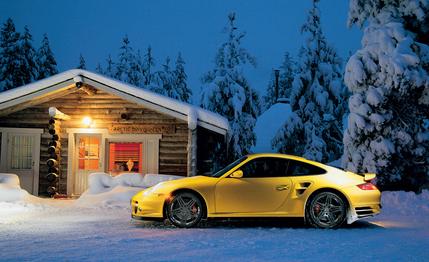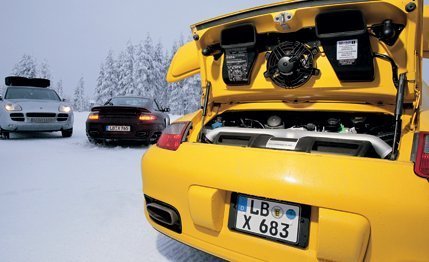
 First Drive Review
First Drive Review




This is the sixth generation of the 911 Turbo. What could possibly be new about this new model?
It has a new turbocharged engine with variable-geometry turbos that make 473 horsepower and 502 pound-feet of torque—58 horses and 87 pound-feet more than the last one. There's also a new four-wheel-drive system with electronic control over the way torque is distributed among the four wheels. And thanks to the use of aluminum in key locations, it's about 90 pounds lighter than the 996 Turbo. Aluminum doors alone save 31 pounds.
How different does it look from the standard 997?
Not very. The Turbo uses the body of the 997 Carrera 4, which has wider front and rear fenders—1.7 inches overall. From the front, it looks a little like the Carrera GT, but most bystanders will still see a 911.


Detail changes include a unique front spoiler and a rear one that's a two-stage affair, as it is with the 996 Turbo. New lower rear bodywork matches the special Turbo exhaust pipes. The drag coefficient is 0.31, and the Turbo body generates virtually no lift in front and a little downforce in the rear when the spoiler is extended.


The 911 Turbo has often been Porsche's new technology leader. What's new or innovative on this one?
The variable-geometry turbos on the new VTG engine virtually eliminate turbo lag above 2000 rpm. The peak torque of 502 pound-feet is available for 10 seconds during a special overboost mode of 20.9 psi. Normal peak torque is 457 pound-feet. The new Porsche Traction Management (PTM) combines the electronically controlled four-wheel-drive system with the Porsche Stability Management (PSM) feature to employ the torque distribution to balance the car's handling and maintain traction and stability.
Is this Turbo the first Porsche to get the new twin-clutch type of transmission?
Not yet. But a six- or seven-speed version of this technology, which Porsche calls PDK, is currently being tested and will probably be introduced during the life cycle of this model.
How much quicker will this new Turbo be?
With substantially more power and less weight, Porsche predicts this 911 Turbo will accelerate from 0 to 60 mph in less than four seconds, which is about 0.3 second quicker than its predecessor. With the manual transmission, it should stop our clocks in about 3.6 seconds. Claimed top speed increases from 189 to 193 mph, although we measured 192 already with the old car. Commensurate improvements should also be realized with the optional five-speed Tiptronic transmission.
Will this Turbo continue the top-of-the-line luxury tradition of previous Turbos, or will it move in the track-oriented GT2 direction?
The Turbo will remain luxury-oriented and come fully equipped. A future GT2 version will provide a more focused track model.